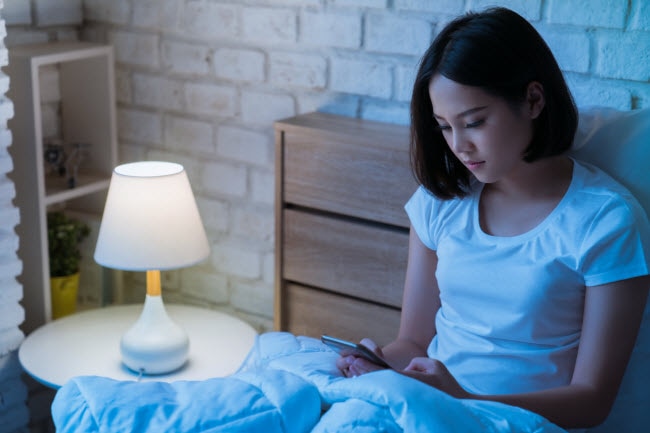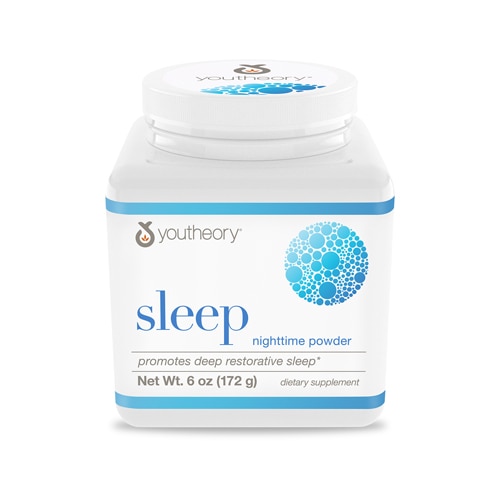Are you one of the millions of Americans who have trouble sleeping? Finding ways to remedy sleep problems could greatly improve your health: Research has linked insufficient sleep to weight gain, depression, heart disease, and other health conditions we’d all like to avoid. While the reasons for insomnia are numerous, some of our modern habits may be behind the epidemic of disturbed sleep.
One possible culprit for your sleep troubles? Too much light exposure at night.

Many people don’t realize that light sends messages to our brains that alter the hormones controlling our sleep. Remember circadian rhythms from high school biology class? We have internal clocks regulated by light, and when we expose ourselves to light at the wrong times it can alter our natural sleep patterns. Total darkness has historically cued our bodies to snooze. When you’re sleeping in dimness instead of actual darkness, your body’s production of melatonin, a key sleep hormone, will drop accordingly. That makes getting good sleep more challenging, since less melatonin in your system means less sleep for you.
Researchers have found that even light far dimmer than your average table lamp has an effect on your melatonin production and sleep duration. The effect on melatonin is especially significant if that light is blue, like that emitted by most CFLs and LEDs.
Want to sleep better? It’s time to give your bedroom a light makeover.
How to stop light pollution in your bedroom
First, do a light audit to determine if your room’s too bright. Turn out the light for the night and give your eyes time to adjust. How much can you see? Ideally, you shouldn’t be able to see anything. But in all likelihood there are tiny sources of light that can add up to big problems for your slumber.
Is there light coming in an uncovered window or through the cracks around a shade? Most of us live where nighttime is far brighter than before the invention of electric light. If you’re not blocking outside light with good room-darkening curtains, your bedroom will be lighter than ideal for quality sleep.
Is your white noise machine or alarm clock emitting light? Consider changing out your clock for one that doesn’t have a light, or place a book over the display. If you’re using an essential oil diffuser for sleep-promoting scent, be sure the light is off or covered as well.
Even a smoke detector with an active light emits a surprising amount of light. Putting black electrical tape over it and any other light sources can cut light pollution in your room.
Because blue light is especially disruptive to your body’s sleep-wake cycle, if you must have a nightlight to help you find your way to the bathroom, choose one with orange tones rather than blue ones.
Cover your eyes!
If there are still issues with light pollution in your bedroom, get yourself a good sleep mask. You might feel silly at first, but you’ll quickly get used to it. Even though there’s very little light making it into my super-dark bedroom, I’ve worn a sleep mask for years now, and it’s one of the cues to my body that it’s time to conk out for the night. It’s especially useful for keeping out morning light when it starts at 5am in summer and my room-darkening curtains aren’t quite up to the task of keeping out the dawn.
An eye mask is also terrific for travel when you don’t have great curtains in your hotel or guest room.
Cut pre-slumber light exposure
The light you see before bed has an effect on hormone production as well, signaling your body that it’s still daytime and keeping melatonin levels artificially low. A 2011 study found that typical room lighting significantly suppressed melatonin, delaying its onset and shortening its duration by 90 minutes.
The more light you’re exposed to after dark, the later your body will be ready for sleep. Melatonin production overall will also be lower, resulting in less total sleep.
What to do: Keep lights after sunset to a minimum, and avoid blue-toned light as much as you can. Any light bulbs used by the bedside should be orange in tone, and as dim as possible to avoid disrupting your body’s production of melatonin.
Mind those screens! Electronic devices like TVs, tablets, and phones are top sources of blue light before bedtime. Research has shown that reading on a screen before bed can significantly delay sleep and reduce its amount and quality. If you must look at a screen before bed, consider wearing blue-blocking glasses and install an app on your device to block blue-toned light. A number of free apps like f.lux can help prevent your social media time from derailing your trip to dreamland.
According to recent research, when (or if) we’re exposed to bright morning light can also have a profound effect on our sleep patterns. Just as our bodies need the cue of darkness to shut down, bright light in the a.m. tells us to wake up and start our internal clock for the day. So throw open those curtains first thing and let in the morning light. When possible, get outside in the morning sun as early as you can to give your brain a powerful light cue to help set your internal clock.
If morning sun exposure isn’t an option, a lightbox may help you feel more alert in the morning and help set your body’s timing for melatonin production, leading to better sleep at night.
Armed with this knowledge about how light affects sleep, you can make some simple changes to your bedroom and habits that may dramatically improve your ability to a good night’s sleep. Sleep tight, without light!



